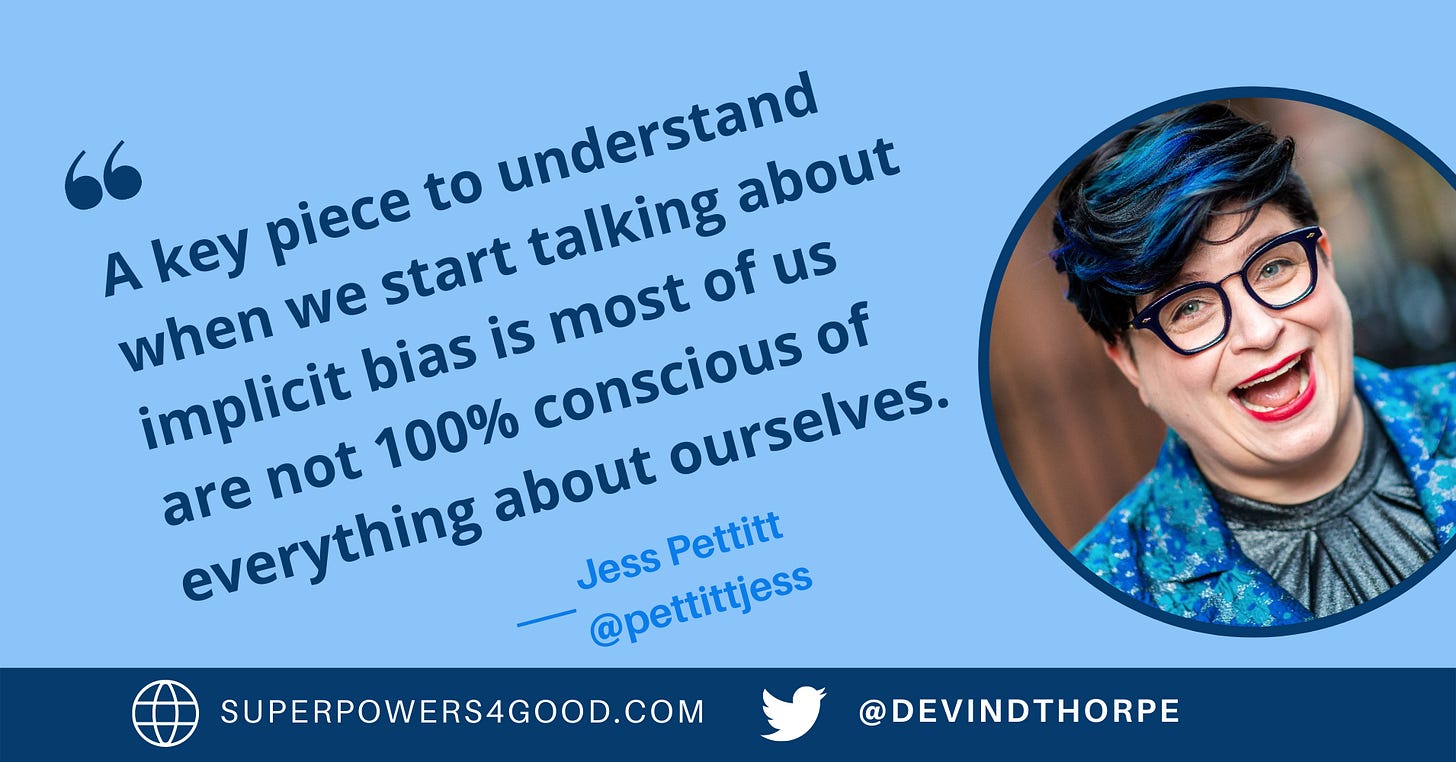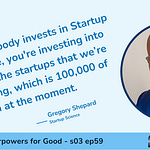Devin: What is your superpower?
Jess: First thing that came to mind was ruining food. I’m not a cook. That is probably my strongest superpower—not delivering a very easy recipe, especially if it says like easy or like one-pot dinner. Yeah, I will screw that up. That’s my biggest superpower. But you probably meant something positive. So I would say finding a space to equalize the tension in the room through humor. And burning dinner.
The Story of Jess Pettitt
Jess Pettitt worked in diversity at New York University for 20 years. “At the time, I was also a raging alcoholic,” she says. She needed another outlet and did comedy on the side. “I was actually the first out lesbian emcee of a lesbian show in New York.”
Now sober for 18 years, Jess has learned that she enjoys supporting a wider variety of systems than just education. Working with associations and corporations as a speaker and consultant on diversity, she has found her bliss.
Avoiding the Easy ‘Yes’
Often, an organization lacking diversity will point to an open door as an adequate invitation to diverse members. She suggests a process she calls “avoiding the easy ‘yes’” to progress toward greater inclusivity.
Using her work with educational institutions, she sees a clear example. If the scholarship recipients are not as diverse as hoped, she suggests looking first at the applicants. If the pool isn’t as inclusive as expected, the description of the scholarship or the process for disseminating the information may be misaligned.
If the selected scholarship recipients aren’t as diverse as the pool of applicants, “then you can look at the rubric of qualifications or the bias of the process in which the winner is being chosen,” Jess says.
“Every system is exquisitely designed to produce the results it gets,” she says, quoting Frances Kendall.
Diversity requires effort. Avoiding the easy ‘yes’ is about designing processes to recruit candidates for a job or membership in new, more diverse places. Continuing what you’ve been doing will likely yield more of the same.
Understanding Our Own Implicit Bias
“A key piece to understand when we start talking about implicit bias is most of us are not 100% conscious of everything about ourselves,” Jess says.
Harvard provides a free online self-assessment of implicit bias you can take in just a few minutes.
Choosing to examine your own bias is tough but foundational for eliminating or reducing our own bias. Jess explains, “We are working towards becoming more conscious of what we are currently subconscious of.”
“To become more conscious of the subconscious, you have to provide a space to be like, ‘Oh, I didn’t know that about myself.’ And then you can decide to keep it, change it, or get rid of it,” she says. “But until you provide that space, you’re not actually engaging in the work of becoming conscious of the subconscious.”
“We make judgments and assumptions to feel safe and prepared,” Jess says. “That doesn’t mean that we’re correct, which is where stereotypes or mistakes can often be made.”
Jess presents a thought-provoking question for introspection: “What about the scenario that I have now written in my head through judgments and assumptions is making me feel safe and prepared, even though it is inaccurate?”
One application of her thinking is within corporations. “Most businesses are about profits and efficiency, and so there’s no room for failure,” she says. “So what that means is that you’re actually stifling the talent of your employees because they become terrified to fail. But your employees are supposed to be innovative and creative, and you’re not encouraging that atmosphere.”
‘The White-Guy Whisperer’
“They don’t call me the white guy whisperer for nothing,” Jess says. “that is 100% my comfort zone. And it seems to be the group of people that most respond to my humor and my style of blending humor with really challenging self-work.”
Her work is challenging, but she works to make it as comfortable as possible. “I can’t convince anybody to do anything. But I can showcase that it’s safe to do this work with me and that I’m expecting it to be safe for me to be doing this work with you.”
For some white men, Jess thinks genuine introspection about diversity is an adventure:
I've never been a white man, but I think that it's the first time that they have been invited to an adventure. So they're not in charge of the adventure. They're not leading the adventure. They're just on the ride. And that invitation seems to be pretty quickly contagious because it provides a space. I'm not going to say it's a safe space or a brave space, but it provides a space for the obligations that specifically white men either are afforded, given or taken on themselves to kind of get off the white savior horse and do their own work from a place of humility and ego so that they can be responsible for who and how they are.
Good Enough Now
Jess is the author of Good Enough Now. She describes it as, “Good enough now. Doing the best you can with what you’ve got some of the time because it’s better than nothing, never.”
Company culture can be a conduit for inclusion or exclusion. “Culture happens whether you’re paying attention to it or not,” she says. “It doesn’t need its own section in your strategic plan in order to exist. It exists.”
“Trying is exhausting,” Jess says. “How does one try to try when I’m already turned off, or kind of not excited, and I’m kind of backing away from a conversation or a relationship or an opportunity? How do I begin the momentum forward?”
Her book and her training help people and organizations to identify and take critical next steps.
In all her work, Jess uses her humor superpower.
How to Develop Humor As a Superpower
Jess shared a specific example of how she once used her humor superpower to defuse a tense situation:
I was at a conference in New Mexico and I was keynoting… '[for] an organization that had something to do with education. I don't remember the specifics.
A young man from the Department of Education was giving a presentation in the morning, and then there was a woman comedian who was kind of emceeing the day.
So, this man did the presentation about education to test statistics in New Mexico.
Then the emcee came up to do kind of an icebreaker and warm up the ballroom. This is pre COVID when people still sat shoulder to shoulder. And the emcee came up and her intro comedy skit was basically sexually objectifying the Department of Education guy who had just done the presentation to the point that she was quoting, like divorce rates, gave out her room number, offered him her room key.
He is now at the back of the room at the breakfast buffet beat red, like super embarrassed. This is not good. So I'm up next as the keynoter. The emcee is just going on and on and on and I'm noticing the electricity in the room. This is super awkward.
This was an elected official that everyone in the audience really looked up to and really appreciated all the information. The board of directors are in the room and they are freaking out about the connection between this conference, their work and the Department of Education. It's not good. I think I've painted the picture. It's not good.
Yeah. So my job is not to fix that. I don't know anything about the Department of Education in New Mexico. Right? Like, that's not why I'm in the space, but there's no way I was going to let that moment go because of my superpower. So I have a keynote that I need to do and keep the conference on time. It's the opening keynote, but I'm starting off in a place that I have the ability to fix in a sentence, right? So not everybody can do that. So evidently some people can cook. So I'll take this skill.
So I got on stage and the first thing I said was, in light of MeToo sexual harassment, a culture that is based on sexualized violence, it is important to name that regardless of the gender of the receiver or the target or the sender. That kind of behavior is not appropriate. It's not tolerated. And I understand that it might be seen as funny, especially across power dynamics, but that's not really what we're here to talk about today. What we're here to talk about today is how hard it is to be a schoolteacher. Right? Or something to that effect.
It was just a punchline that instantly brought everybody back into the room. It broke the tension. Everyone laughed, including the Department of Ed guy at the back, at the potatoes, turning red. The emcee who didn't realize like she just as a comic, like you're just starting and you don't know the crowd, right? This isn't a bar, so you're going to have to monitor what you say and what you do. It's a different context. The board relaxed and then I just went into my keynote.
“I have the ability to feel that tension and like running towards it instead of getting nervous, using only the weapon of equalizing humor. Nobody felt bad, and it was fixed in 30 seconds,” Jess concludes.
Jess sees her superpower as having two sides. First, she discerns what is going on. Then, using humor, she creates a space for discussion.
Learning to be funny is challenging, but Jess says you aren’t born with the ability to be funny. You learn it.
“Most truly funny people have really dark experiences, have experienced a lot of pain and suffering,” she says, reflecting on her own experience with alcoholism. “Those dark experiences kind of come together to create a light space, and the freedom to experience humor means that you are welcoming a joke to bomb.”
That’s the key, having a willingness to fail. Many people who have experienced terrible pain can see a joke fail and be okay with it. “Are you willing to fail, and are you willing to notice you failed?” she asks. “You become funnier because you’re more willing to take risks.”
By following Jess’s counsel, you can add humor to your quiver of superpowers, enhancing the rest and enabling you to do more good.















